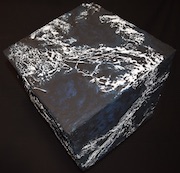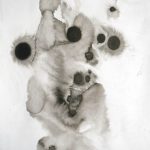The following email interview between Robert Rich and Simon Kropaczewski occurred in early March, 2001. The questions have a few translation problems, but they appear here in their original form.
1) One can say, that exists sphere, which we could call as philosophy of dream, is this sphere of science with full rights, or rather accessory matter having something from shamans frames?
It can be science, art, metaphor, belief, anything. Our models of any phenonemon never completely describe that thing. If you consider dreams from a shamanic world view, that doesn’t invalidate the findings of the scientific study of dreams. Both views have meaning within the framework of the viewer. My own preference is to understand the scientific background, but also derive creative stimulus from a more intuitive appreciation of the metaphorical possibilities of sleep and dreaming. A dream can still inspire or instruct, even after you learn a bit about the physiological state of REM sleep.
2) What is a dream (not dream in it’s metaphysic dimension but physiological), what for we lose time on state of practical ignorance?
Scientists still might disagree a bit about “what is a dream.” Let’s just say that the human mind is capable of building internal worlds. We constantly create our world. The “real” world as we perceive it is still an internal model based on our perceptions. The human mind is also capable of many different states of consciousness that differ from our normal waking mode. In some of these states, the mind is actively building completely internal worlds that are not based on direct sensory input, and it is improvising new relationships and connections within its memory strucure. REM sleep is one such state. The dream itself might be a process where the brain is forging and strengthening relationships, connecting old memories with recent experiences, or reinforcing emotional meanings. These cognitive processes are occuring beneath a tableau of mental world-building, image-creation, dialog, theatre, in a state of consciousness where the senses do not dominate. If we disturb someone’s REM sleep, they will have trouble learning new things, and eventually will begin hallucinating while still awake. Our mind needs this dream state to function properly.
3) Why some of people are able to sleep so strongly, that even greatest noise is not in a position to wake them up, and other are so vigilant that react on every whisper. What does it join with?
I don’t know. There are many reasons that people sleep differently. Old people sleep more lightly than young people, soldiers sleep more lightly in battle to listen for danger, and new parents sleep lightly to listen for their baby crying. Caffeine, alcohol, and many medicines will also disturb our sleep. Excersise can help us sleep better. Everyone is different.
4) And what is this a dream in understanding of psychical sense, I mean here things which appears in consciousness during dream?
I don’t quite understand your question. (A language problem, I think.)
5) How strongly things, which happen round us, have image in our dreams?
Sometimes our environment effects our dreams, but often in an indirect way. Sometimes when we awaken briefly during the night and hear a sound, that sound will enter our dream as an image or scene. Sometimes, sounds or body sensations will actually enter our dream content directly while we sleep. Also, we have a different type of dream, called hypnogogic images, which do not occur during REM, but during the lightest stage of sleep, as we are awakening or falling asleep. Sometimes these hypnogogic images will relate directly to our environment or waking thoughts. The music during a Sleep Concert relates mostly to this experience.
6) How to reign over a dream, to influence on what we feel?
We can learn a skill called lucid dreaming, where we become aware that we are dreaming while we are still in the dream. This is a very beautiful and exciting feeling. Once we are lucid, we can do almost anything we wish, as a character in the dream. Skilled lucid dreamers often learn that they can have a more profound and useful dream experience by staying within the framework of the dream – but staying aware and observant – rather than forcing the dream into a totally new shape. Dreams have a certain “inertia” and sometimes we should just let the dream show us where to go. Lucid dreams can be wonderful learning tools, and also just good fun.
7) You say, that very strongly on a dream has influence such insignificant matters as rattling of insects, rustle of leaves, pasturing of rain, skipping all this prevalent turmoil round us, how to perceive these details?
Allow these sounds to paint a virtual world around you. It’s like a painting of a landscape, but the landscape is in your own imagination.
8) Several people spending in the same room can be factor enlarging intensity of sleepy experiences, but can also hinder, for example with snoring, how to avoid these traps?
It is very hard to avoid these disturbances in a live Sleep Concert. It’s just part of the atmosphere of a group sleeping environment. I wonder about the cultures that sleep in large communal houses, like the long-houses in New Guinea or some native American cultures: twenty to forty people sleeping together every night, families with babies, couples making love, everything. Our ancesters also lived this way. Perhaps we have a memory for these sorts of nocturnal disturbances. Perhaps we can learn something if we experience sleep communally, snoring and all.
9) Is that true, that people, who snore are usually ill and bad?
I hope you don’t mean they are “bad” people! Of course not. Sometimes people will snore if they are overweight, or if they have an allergy or a cold. However, some people just have an extra fold of skin in their throat that flaps during sleep when the throat muscles become relaxed. This is not their fault, and it’s not a sign of illness.
10) To actuate people to feelings of sleepy ecstasy or different states of consciousness it can be used different drugs, you know what I’m thinking about, this surely the worst solutions from different possibilities leading to tragedy?
It is always better to learn about the natural ways for our minds to experience ecstacy. We all have an inborn ability to to experience these states without drugs.
11) You try to actuate our thoughts by music – which features good music should realize, let us call it relaxation music?
I don’t think of my work as “relaxation music.” I want it to be absorbing and calmly intense. I like to have enough space between the sounds that the mind becomes sensitized. I want enough fine detail that listeners can discover more information each time they listen. I don’t want the music to force its way into the listener, but rather invite the listener to enter a strange and fascinating new world.
My own favorite music works more like a question mark (“?”) than an exclamation (“!”). I am attracted to mystery and beauty – not a simple beauty, not “prettiness”, but a complex beauty that includes both life and death, nostalgia and poignancy, smoothness and coarseness, the full texture of life.
12) “Trances & Drones” contains songs, which came into being almost 20 years ago, have they never became revealed wider to the publics earlier, besides concerts of course?
I issued Trances and Drones on two cassettes in 1983, then on CD in 1992. Both went out of print, so Release re-issued them. Slowly, each year, new people discover them.
13) Do you know, that Release/Relapse it’s a record label promoting very brutal music?
Yes, it’s a strange relationship for me. Oddly, many of the people who like that darker music are also attracted to what I do. I think they find that my work still has an intensity and energy that appeals to them, but it affects a different part of the mind. Maybe it provides a break from the violence, without seeming naive or “pretty”. Anyway, you can’t always be angry!
14) Returning to “Trances & Drones” – would you be able to qualify us substance of each of seance, I can say anything about this theme with difficulty, we have six composition and I do not know, what can I find within them?
I wanted to create a musical experience that would engulf the listener like a womb, but when it stops playing it becomes difficult to remember the details, like a dream. I wanted the music to create its own altered space and time, like a special place that you go, which leaves only a perfume in the air after listening, nothing solid. Each piece on the album accomplishes this journey in its own way.
15) Do You think, that words would disturb this specific harmony prevalent in this music?
No, I don’t think words will hurt it, but they might not succeed in decribing it. If you try to describe the taste of a food, it is still not the same thing as eating it.
16) How did you present these sounds on scene, how took it listeners, you observed them?
I was alone when I recorded the music on Trances/Drones, and there was no scene of people playing this kind of music. I did not have an audience for this, so I only used myself as a measure for its success. The same is true with most of my music. I don’t really know what other people hear when they listen.
17) Could be on “Trances & Drones” found motives acting on our subconsciousness, something what we do not hear, and what actuates us mentally?
Perhaps, but if so, I did not plan it. Some parts of the music happen unconsciously for me, and I don’t even know why some of my compositions feel stronger than others. I try to respect these successful accidents when they happen.
18) Do You think, that with music we can attend people?
Do you mean, heal people like medicine? Perhaps. Most people know some music that they use to make them feel better, at least emotionally. But I don’t think we can predict a simple relationship between sound and healing. Something that you creat to help one person might drive another person crazy. If I played Lawrence Welk or Liberace for an 90 year old woman, it might help her relax. If I played the same music to a ill 20 year-old, it would probably make him sicker! If I played Trances/Drones to that old lady, she might think it was evil or depressing. Music is not a universal language, nor is it a science – it is bound to culture.
19) And going even farther, can music become a tool in hands of politicians, businessmen?
Of course. It’s called marketing. In Jamaica in the 1970’s, both left and right wing politicians were using songs by Bob Marley for their campaigns, while factions were killing each other over their political differences. Microsoft used the Rolling Stones. Advertisements bombard us with music constantly, and Muzak drips through shopping malls. It’s hardly a secret. We can abuse anything if we have enough motivation.
20) Is man already very ill, when he dreams about marchpane tanks?
I don’t think I understand the translation of your question. If you mean, “are nightmares a sign of sickness”, I think the answer is “it depends.” There are many bad things in our world, and a healthy person must come to grips with the evil that exists in the world. Nightmares are a way for the mind to explore darkness in the safety of sleep. Sometimes, nightmares are simply a meaningless model-building reaction to an unrelated physical sensation, perhaps triggered by caffeine or even too much vitamin B. Our sleeping mind can sense an unrelated physiological activation and might create a fearful dream to explain the sensations. But some people have serious difficulties with recurring nightmares, which could be triggered by a disorder like post-traumatic stress or possibly an obsessive fear. Wartime experiences can trigger nightmares for life. This situation can be helped with behavioral or medical therapies. Perhaps, though, I am not understanding your question, and you speak of humanity’s tendencies towards violence in general. I don’t know. I’m only a musician.
21) You investigate dreams, but can you also explain meanings of dreams, whether in dreams stay grain of truth, in other words, do dreams fulfill sometimes?
I think the dreamer understands the meaning of the dream better than any outsider. Dreams reflect the interplay that occurs when the world enters our senses and becomes modeled in our mind. Our minds can create models that predict some part of reality. We do this all the time in normal consciousness, so why not when we dream? For example, I predict that when the sun sets, it will get dark. I predict that I will eat a salad for dinner tonight, and I will talk with my wife about her work. I can vividly picture this happening in my mind. Do I have special powers to know the future? Of course not. We are predicting the future every moment, and certainly from time to time we will be accurate, and we will think back and say “I had a dream that this happened.” I do not mean to trivialize this occurence. It is actually quite a magical thing that we are doing every moment, building models of the world around us.
22) Do you sleep long? Putting to bed, is this from your side like a real ritual?
I simply sleep when I’m tired, and awaken when I’m rested. Truly, I don’t obsess over these matters.
23) Well, I wish you sweet dreams!
Regards Simon Kropaczewski
Thank you – also to you.
– Robert






You must be logged in to post a comment.